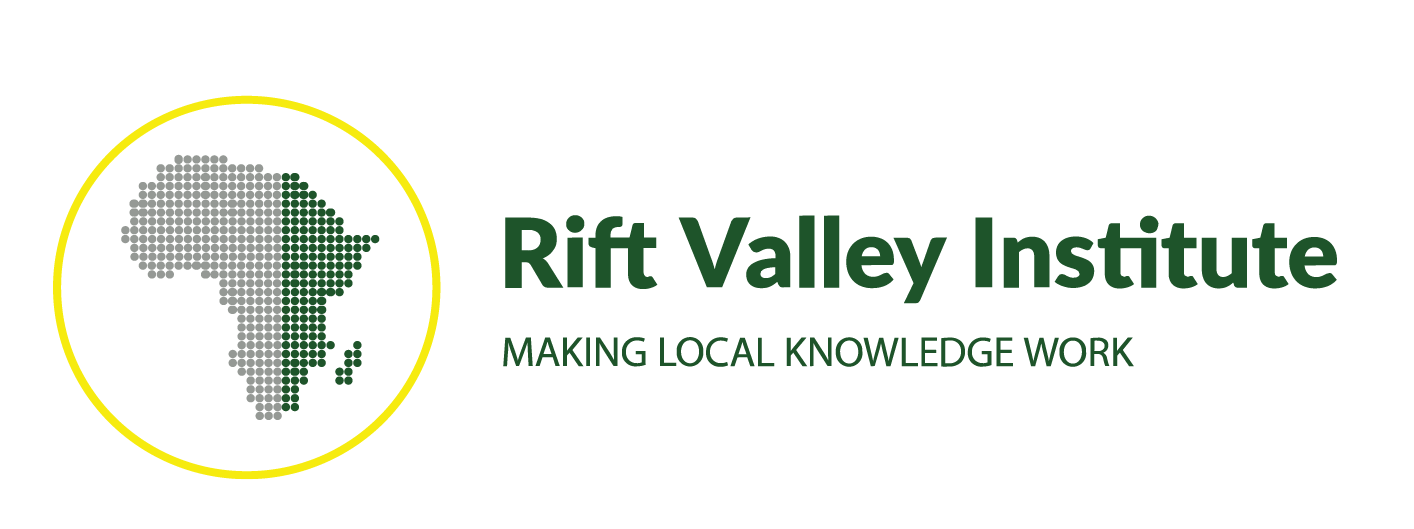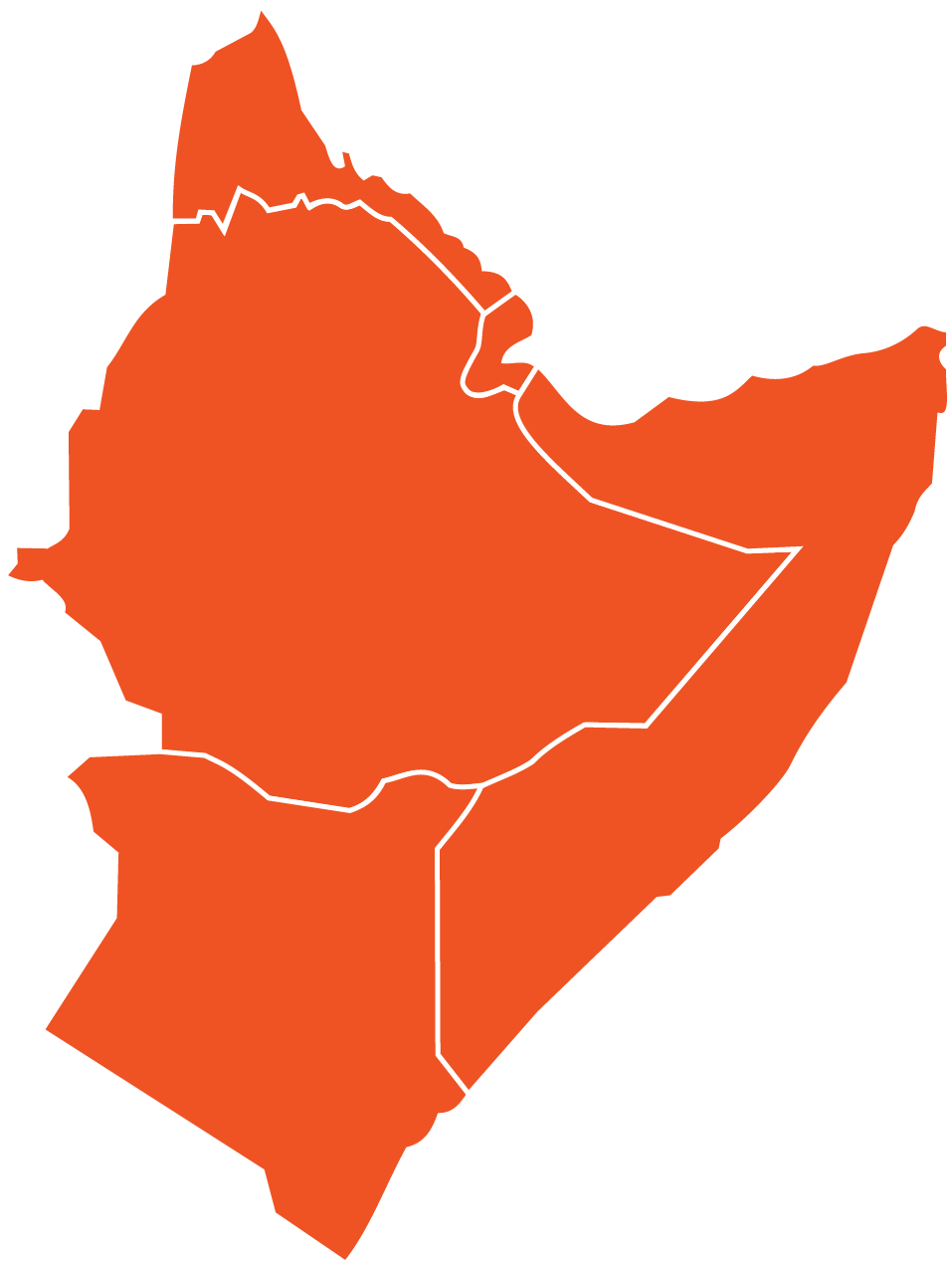
COUNTDOWN
To CourseTHEME
Turbulent Waters in the HornThe Horn of Africa is entering a fifth year of extreme turbulence, a period that is testing the resilience of its states and citizens. The onset of the era of crisis began with the 2020 COVID pandemic and Ethiopia’s bloody Tigray war and has not abated. Today, the region is roiled by armed conflict, unrest and fragmentation within states, deep political tensions between states and the spillover of violence, forced displacement of populations, climate crisis and terrorism across state lines.
The expression ‘turbulent waters’ is a metaphor for an environment that is difficult to navigate politically, but we chose the expression as the theme for the RVI Horn of Africa course 2025 for its literal meaning as well. Never have the waters emanating from and surrounding the Horn been such a source of tension and conflict, from dangerous disputes over the Nile waters to global and regional contestation over the region’s increasingly valuable seaports, fisheries and offshore oil in the Red Sea and Indian Ocean. This year’s course will include sessions devoted to the region’s many ‘water wars’ and what they reveal about wider political economy dynamics in the Horn of Africa.
Director
of Studies
DR KEN
Menkhaus
C. Louise Nelson Professor of Political Science, Davidson College
Ken specializes in Somalia and the Horn of Africa, and has published in the fields of development, conflict analysis, humanitarian response, peace operations, peacebuilding, state building and violent extremism. His work involves both academic research and policy work with the US government, the United Nations, the World Bank and non-governmental organizations
Course
Teachers
Jason
Mosley
Senior Manager, Publications and Information, Rift Valley Institute (RVI)

With more than 20 years of field experience in the Horn of Africa, Jason has undertaken a range of policy and academic research consultancies, focused on political economy issues across the region. He is a Research Associate at the African Studies Centre, Oxford University and Managing Editor of the Journal of Eastern African Studies. He was an Associate Senior Researcher with SIPRI’s Conflict, Peace and Security area from 2020-25, and an Associate Fellow of the Africa Programme at Chatham House from 2012-18. Prior to this, Jason was the Senior Analyst for Africa at Oxford Analytica from 2005-12. He has an MA in African Studies from SOAS, University of London.

Subeida
Mukhtar
Deputy Team Lead, Somali Dialogue Platform

Subeida brings more than 12 years of experience in democracy and governance across Somalia and Kenya, with a focus on political settlements, federalism and inclusive dialogue. Her work centres on navigating complex political landscapes to support consensus-building and institutional development. Prior to joining RVI, Subeida held leadership roles across government and development sectors, including Secretary General of the Benadir Region and Mogadishu Municipality. She has contributed to key governance and reform efforts through positions with the Ministry of Planning (FGS), USAID’s Strengthening Somali Governance project, and the International Organization for Migration. She holds a Master’s degree in Public Administration from Howard University and a Bachelor’s degree in Information Technology from Georgia Southern University.
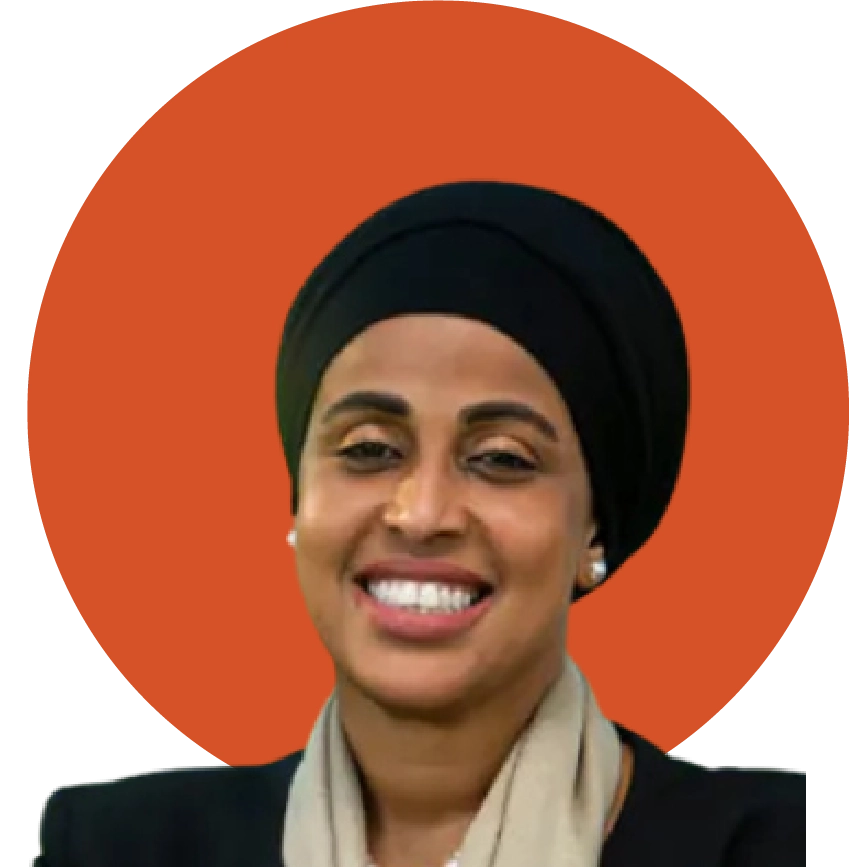
Hodan
Hassan
Executive Director at Kulan Consulting

Hodan Hassan is a distinguished development professional with two decades of experience driving impactful change in fragile and conflict-affected states. She has played a pivotal role in shaping stabilization and peacebuilding efforts, working closely with the US State Department to strategically leverage USAID programming for the successful implementation of peace agreements in Sudan and Somalia. As Deputy Director of USAID Somalia, Ms. Hassan spearheaded a rapid expansion of the office’s budget and personnel, positioning it to deliver transformative development initiatives. She was instrumental in conceptualizing, designing and executing innovative programs, including USAID’s first country-level strategy for Somalia and a ground breaking $100 million stabilization initiative. Through her consulting firm, Kulan Consulting, Ms. Hassan advises governments and international organizations on transformational capacity development, inclusive economic growth, socio-political context analysis and knowledge management. Her clients have included USAID, UN agencies, World Bank, the EU and FCDO, among others.
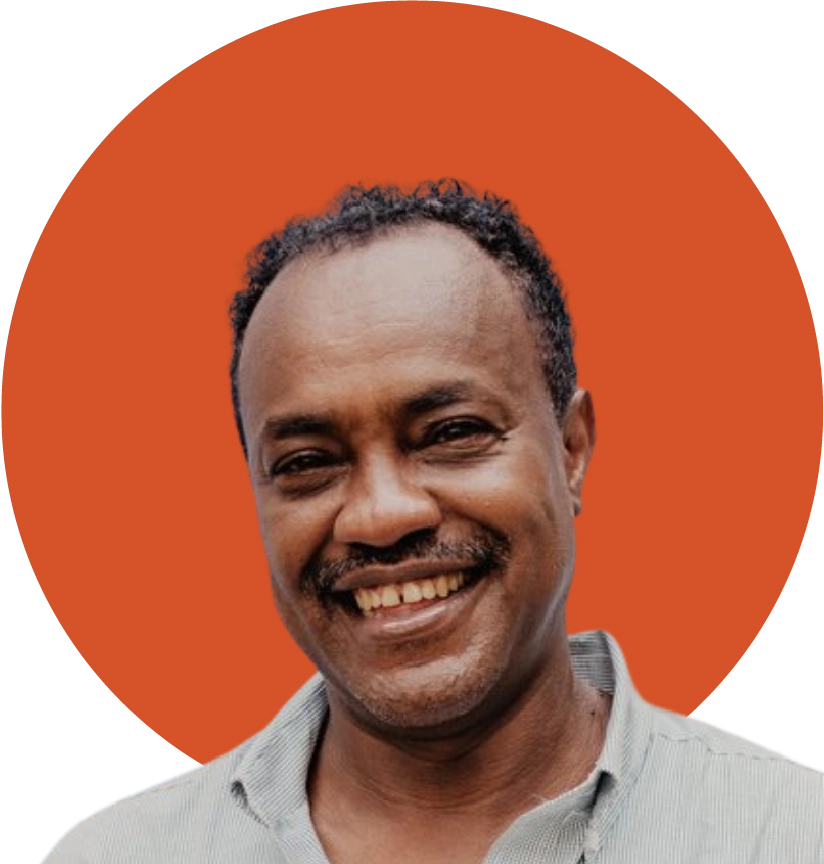
Dereje
Feyissa
Associate Professor at Addis Ababa University; Guest Professor at University of Tuebingen, Germany

Dereje holds a PhD in Social Anthropology from Martin Luther University, Germany. He was a research fellow of the Max Planck Institute for Social Anthropology in Germany and University of Osaka in Japan. Dereje’s research interests include centre-periphery relations and state formation in Ethiopia, political transition and political economy of development. He is the author and editor of several books and articles in peer-reviewed journals, including: Migration as a collective project – the experience of Hadiya migration to South Africa (forthcoming, Routledge); Ethiopia in the Wake of Political Reform (2020, Tsehay publishers) and Playing Different Games – the paradox of identification strategies of the Anuak and the Nuer in the Gambella region, western Ethiopia (2011, Berghan).

Michael
Woldemariam
Associate Professor, School of Public Policy at the University of Maryland; Senior Fellow, Center for International & Security Studies at Maryland

Michael’s teaching and research interests are in African security studies, with a particular focus on armed conflict in the Horn of Africa. His scholarly work has been published in a wide-range of peer-reviewed journals and his popular essays have appeared in outlets such as Foreign Affairs, Foreign Policy and Current History. His first book, Insurgent Fragmentation in the Horn of Africa: Rebellion and Its Discontents, was published with Cambridge University Press in 2018. In addition to his scholarly work, Michael has consulted with a number of international organizations, primarily on issues related to politics, governance and security in the Greater Horn of Africa region. He holds a BA from Beloit College, and MA and PhD degrees from Princeton University.
Course
ResourcesTurbulent Waters in the Horn
Day 1
Peoples, land and history of the Horn
Monday, 26 May 2025
- Overview: Peoples, livelihoods and identities
- Land, politics and society in Ethiopia and Somalia
- Historical developments and religions in the Horn
- Regional and global relationships up to 2017
Day 2
Contemporary politics
Tuesday, 27 May 2025
- Ethiopia’s political transformation and civil conflict
- Political dynamics: Somalia, Eritrea and northern Kenya
- Elections, constitutions and federal governance trends
Day 3
Turbulent waters
Wednesday, 28 May 2025
- Climate change and hydro-politics
- Red Sea geopolitics and maritime security
- Offshore economies: piracy, resources and port development
Day 4
Regional/global relations and development trends
Thursday, 29 May 2025
- Migration, displacement and humanitarian trends
- Economic development and external influences (West, China, Gulf states)
- Future regional scenarios and emerging global dynamics
Day 1
Peoples, Land, and History of the Horn
Monday, 26 May 2025
- Overview: Peoples, livelihoods and identities
- Land, politics and society in Ethiopia and Somalia
- Historical developments and religions in the Horn
- Regional and global relationships up to 2017
Day 2
Contemporary Politics
Tuesday, 27 May 2025
- Ethiopia’s political transformation and civil conflict
- Political dynamics: Somalia, Eritrea and northern Kenya
- Elections, constitutions and federal governance trends
Day 3
Turbulent Waters
Wednesday, 28 May 2025
- Climate change and hydro-politics
- Red Sea geopolitics and maritime security
- Offshore economies: piracy, resources and port development
Day 4
Regional and global relations/ development trends
Thursday, 29 May 2025
- Migration, displacement and humanitarian trends
- Economic development and external influences (West, China, Gulf states)
- Future regional scenarios and emerging global dynamics
1.The ecological crisis in the
region is escalating. What
effect has it had on
regional conflicts?
What are some of the
macroeconomic and social
responses to this crisis
Climate change is making seasons less predictable and rendering episodes of both droughts and floods more intense. Populations in the Horn have a variety of coping mechanisms to deal with high variability in rainfall from year to year, but those systems are being severely tested. The biggest single response has been dramatic rural-urban migration, as destitute rural dwellers seek a new life in cities. Rural production in some areas has adapted, with use of more drought resistant crops, changed pastoral migratory patterns, and intensified efforts to capture water in dams and small catchment systems. Fears of actual water wars have not yet materialized in the Horn, but tensions over water use, diversion, and access are high, and communal clashes over boreholes and well-watered grazing areas have increased.
2. How have the changing foreign policies and agendas in the global north affected governance in the Horn
Western countries’ influence still matters but has waned somewhat across the region. Part of this has to do with preoccupation with interests else- where, from Ukraine to Asia, and part has to do with donor fatigue. A big additional factor is the growing role of other external actors, both regional – Turkey, UAE, Saudi Arabia, Qatar – and global – China, and more recently Russia. Western prioritization of democracy, human rights, and rule of law has grown in recent years, which has been welcomed by many but which has strained relations with authoritarian leaders in the region, and lead some to adopt a “look East” policy with China. Despite the high dependence of regional governments on Western foreign aid, political and economic conditionality on aid has had limited impact on government behavior.
3. Have the resource capacities and political priorities of donors and development partners changed with regard to the horn? In what ways?
Stabilization and counter-insurgency objectives dominated much of the donor community engagement in the region post 9/11, and while security sector reform and security agendas are still quite important, they no longer define development priorities as they did in the recent past. Peace building and capacity building continue to be important though challenging initiatives. And, because of the combination of war, drought, and displacement in the region, essential humanitarian response remains a top priority for donors.
4. Have there been any migration policy shifts by regional governments with regard to the refugee situation as a result of displacement within and from the Horn of Africa region?
Important new thinking about durable solutions for the large refugee population in the Horn has emerged in recent years. Host countries are more open to pursuing strategies of local integration and self-sufficiency for refugees, rather than forcing them to remain “warehoused” in camps and dependent on relief aid. This is still in its early phase and initiatives designed to promote this agenda have suffered predictable obstacles, but it is a hopeful development. The greater challenge may actually be finding durable solutions for the millions of internally displaced persons across the region.
